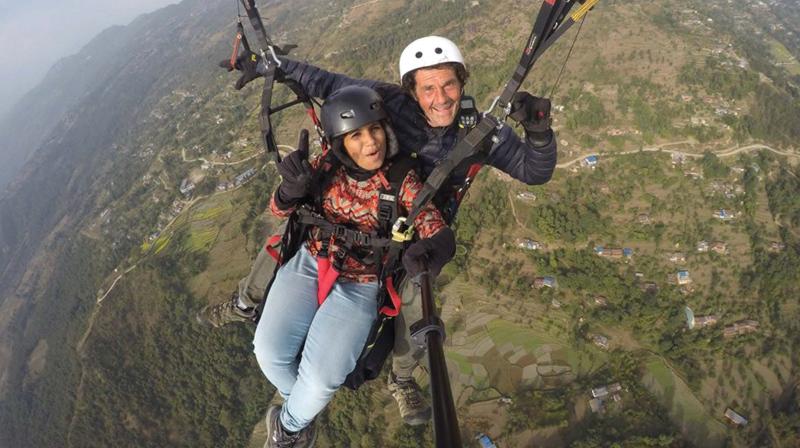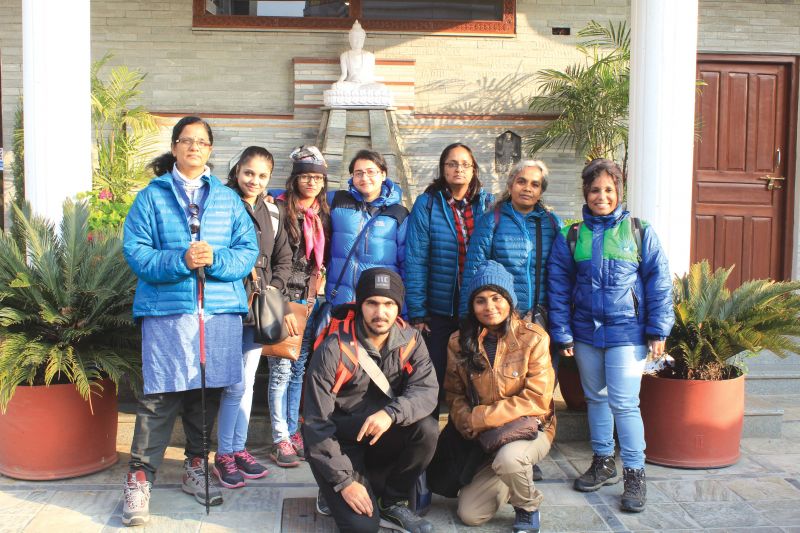High on wanderlust
Let's Go for a Camp' is a travel community that likes to travel consciously.

In two years, Geethu Mohandas and her tribe have camped in 23 different places in India and abroad. Accompany her and you’d wonder at sight-seeing taking newer dimensions right in front of your eyes. Each trip taken by the members of ‘Let’s Go for a Camp’, a travel community, is more than just a break away from the mundane or an escape from encountering the harsher things in life. In fact, she and her team dig deep until the root cause of the environmental issues at these scenic locales surfaces. By the time they say goodbye to the place, quite a difference would have happened for sure.
When it all started way back in 2015, Kochi girl Geethu was a two-month-old tech professional in Bengaluru, who had been setting aside all her income to realise the dream. “From school days, I was an active participant in nature camps. That spark stayed with me. Clubbing it with my passion to travel, I dreamt of giving back to nature in a larger way. For that, I needed money and secured a job. Our motto – travel and skill development – has remained the same right from the very first Kakkadampoyil trip to the latest tour to Nepal,” says Geethu.
So much has happened. Be it towards restoring the dwindling grasslands of Pampadum Shola National Park, the video featuring the dying grass terrain of Paithalmala or collecting discarded plastic waste at Kudajadri Hills in Karnataka, they ensure the message reaches a larger population in society.
A burgeoning Wattle population has been eating away Pampadum Shola’s natural diversity. The water-consuming trees multiplied in thousands, leaving the place near-to-barren.
 The team during a trip to Nepal.
The team during a trip to Nepal.
“The place Vattavada in Munnar is nicknamed ‘winter vegetable garden’. Unscientific forestation of Wattle pushed the low-lying areas to dry up. The authorities realised the mistake and the public was then allowed to restore the lost charm by planting grass there. We joined this cause,” says Geethu.
Their feature on the bruised Paithalmala in Kannur, ‘Paithal Mazha’, reached the tourism division and the video got widely watched and shared on YouTube. The ‘Mist at Kudajadri’ became ‘Green Kudajadri, Clean Kudajadri’ as they collected used plastic bottles from there.
The core team of backpackers is a six-member strong one. There are techies Prasad Aadish Ajaykumar and Sankeerth, magazine journalist Sudhina V.K., and legal professionals Najma and Jaya Chithira Bhaskar to support. “Look at the jobs and places of our people and you would understand how passionate we all are towards our mission. Social media connects us to plan and implement our projects,” says Geethu.
Incidentally, most of these trips have a greater participation of women. “Women do take notice of environmental issues and they like to travel. Our core team alone has four. There were ladies aged above 50 in our Nepal trip, with a history of paragliding and bungee jumping. They were throbbing with energy and took part in our activities with great interest.”
Deciding on Nepal as the destination too had a reason. “We journeyed mostly towards the Western Ghats. The Himalayan regions evoked interest in us. In a six-day camp, we learned the cultural, geographical changes and world heritage of the place.”
There was a special mom and kid camp arranged twice – in Attappadi and Nilambur – namely Ammayum Kunjattayum. The camp Valiya Bhoomiyum Kuttikootavum set at Madayipara in Kannur, was for families with 56 people in attendance, the youngest of them being a six-month-old baby.
Coming next is the largest tour it has taken out so far, an all-India journey, Ithihasa, to tease the history-loving ‘trip’sters. “It is an opportunity for freshers to visit places of historical importance from close quarters and learn. Those who already know history can impart knowledge to others. The muziris heritage area and a package covering the ancient, medieval and modern history of a set of places are devised as of now. It would be a series of visits starting in February,” Geethu explains.
Where does she find the time and energy for it all? “The work culture in Bengaluru can make us spend hours in office on weekdays and doze off on the rest. I chalk out my plans when I return home from work, which is mostly towards 8pm and backpack by Friday night. The other members also work the same way. Chances are you feel easily fed up, unless the passion is so intense,” she smiles.

